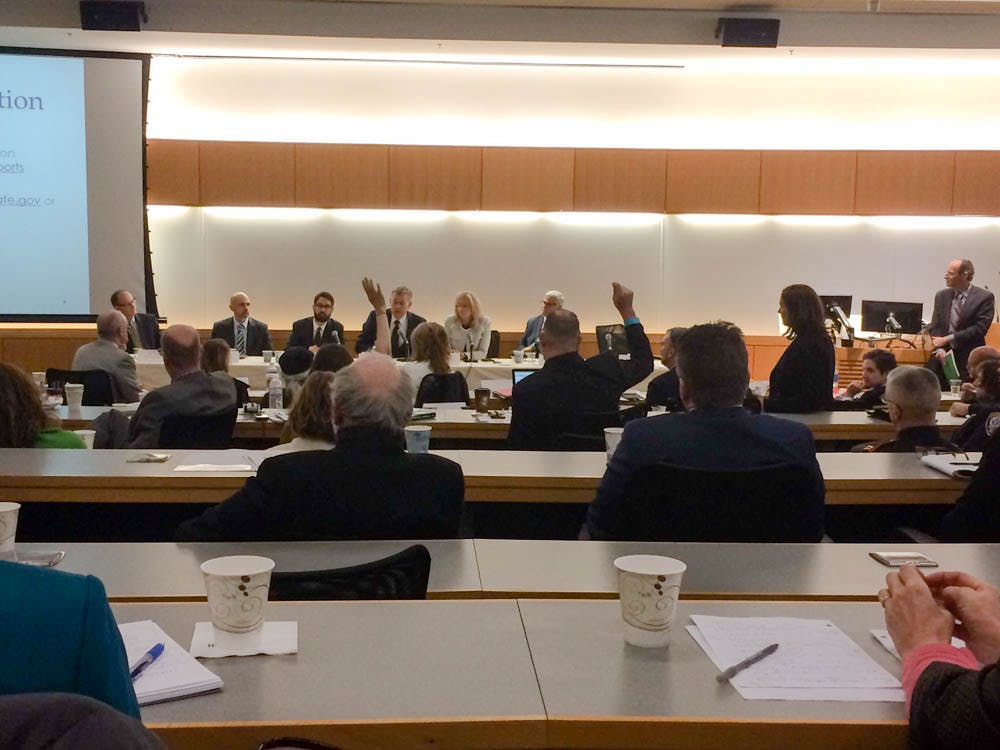As marijuana sweeps to the center of public debate, protestors and progressives — like those who tried to inflate a 51-foot joint replica in front of the White House last week — have been at the forefront of the legalization movement. During Tuesday’s forum at the Warren Alpert Medical School, government officials and public policy experts urged caution, making their case as to why research and regulation must lead the movement.
The forum, titled “Marijuana Regulatory Policy: Lessons from Western States” was sponsored by the Taubman Center for American Politics and Policy, the Conference of Western Attorneys General and Rhode Island Attorney General Peter Kilmartin. Speakers included representatives from Washington and Colorado — states that have already legalized recreational cannabis use — as well as Massachusetts, which is considering doing so.
“The question of marijuana policy is not a simple yes-or-no question,” said Jason Lewis, Massachusetts state senator and chair of the state’s Special Senate Committee on Marijuana, addressing a packed lecture hall. “There are a whole host of complicated policy issues that need to be addressed by legislators, regulators and industry stakeholders.”
Though medical marijuana use was legalized in Rhode Island in 2006 and momentum is building toward recreational legalization, Kilmartin noted that there has been little serious policy consideration.
“I think that this is the first time in the state of Rhode Island we have heard this dialogue,” he said. “So it’s a 100 percent increase from where we were, but 10 percent of where we need to go and what we need to do. We’re not here to answer all of the problems, but to ask the questions and begin the dialogue,” he added.
Representatives from states where this dialogue has been translated into law, including the Deputy Attorney General of Washington and the Assistant Director of Prosecution for the city of Denver, were on hand to lend their expertise.
Though it is too early to issue definite referendums on the impact of legalization on health, crime and other markers, it’s clear that “the sky is not falling down,” said Adam Darnell, researcher for the Washington State Institute for Public Policy and author of the institute’s preliminary report on legalization in Washington.
Not only has the sky not fallen, but, on many fronts, conditions have improved since the legalization of recreational marijuana use — at least in the centennial state. Over 24,000 employees in Colorado are involved in the cannabis industry and are earning hourly wages of about $15, said Todd Mitchem of the Coalition for Responsible Cannabis Production.
“This is opening up opportunities,” he said. “Many people can’t work at Dish Network because they’re users (of marijuana) and will fail the drug test there. Now they can have marijuana in their life without fear of losing their jobs. They can work in the economic system.”
But optimistic views must be tempered with other realities. Driving under the influence is a major issue, as is the difficulty of regulating home growing and the impact legalization can have on youths’ perceptions of the harm marijuana can do.
In response to these dangers, Colorado has channeled revenues from the 3.5 percent tax on retail marijuana to education. “We have been involved in programs about how to talk to youth about marijuana,” said Marley Bordovsky, assistant director of prosecution and code enforcement for the Denver City Attorney’s Office.
In Rhode Island, Sen. Josh Miller, D-Cranston and Providence, and Rep. Scott Slater, D-Providence, introduced legislation in February that would establish a legal, regulated recreational marijuana market, but the proposals are far from becoming law. Just across the state’s northern border, the picture is different.
As Massachusetts moves toward a statewide decision on legalization — likely to come via a ballot question during this year’s election — the Massachusetts Special Senate Committee on Marijuana was asked to “list public health, fiscal health and public safety concerns” associated with the legalization, Lewis said.
Chief among these concerns, according to the group’s findings, are risks to youth. “It is the conclusion of our special committee that evidence on youth consumption is unequivocal,” he said. Marijuana use impacts the cognitive health, IQ, behavioral health and mental health of young people, Lewis explained, adding that these effects are greater the younger an individual starts using the drug.
Compounding these problems, he said, is the fact that research shows that perception of harm among young people has fallen. “Over the past two decades, the number of 12th graders (in Massachusetts) who think marijuana is harmful to health has fallen from 80 percent to 40 percent,” Lewis said.
But some attendees found that the forum focused too much on harm to youths at the expense of discussing the positive effects of legalizing marijuana.
“Unfortunately, the discussion was fairly one-sided,” Jared Moffat, the director of Regulate Rhode Island, wrote in a statement after the event. “There was little mention of the positive impacts we’ve seen in Colorado and Washington: millions in tax revenue being used to build schools and fund health programs, many thousands of new jobs and a drastic reduction of the illicit marijuana market. The truth is that virtually all of the dire predictions from opponents of marijuana regulation have not materialized.”
But all of the panelists took care to mention that it is too early to render full judgment. The Washington State Institute for Public Policy, for one, is analyzing these effects over a 20-year period, Darnell said.
While changes — if any — in graduation rates, health and crime may materialize, it is essential that reflection and analysis continue, Kilmartin said. “Whether you are pro-expansion in this state, pro-retraction in this state or you’re pro-status quo, I’m sure each person ... can take something out of today.”





